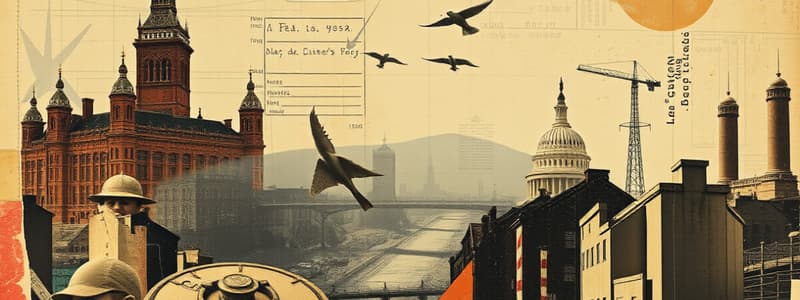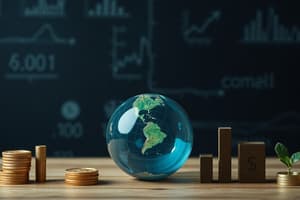Podcast
Questions and Answers
What is economics about?
What is economics about?
Economics deals with choices made by people in the use of scarce resources.
Which of the following best describes microeconomics?
Which of the following best describes microeconomics?
- The study of individual parts of the economy. (correct)
- The study of economic aggregates.
- The analysis of international trade.
- The theory of capital markets.
Macroeconomics focuses on individual parts of the economy.
Macroeconomics focuses on individual parts of the economy.
False (B)
The essence of economics is unlimited wants served by limited ______.
The essence of economics is unlimited wants served by limited ______.
What does opportunity cost refer to?
What does opportunity cost refer to?
What are the factors of production?
What are the factors of production?
Scarcity means that there is an abundance of resources available.
Scarcity means that there is an abundance of resources available.
_______ is a state of balance where there is no incentive to change.
_______ is a state of balance where there is no incentive to change.
Why is ceteris paribus important in economics?
Why is ceteris paribus important in economics?
Which of these is not a necessity?
Which of these is not a necessity?
Flashcards are hidden until you start studying
Study Notes
What is Economics?
- Economics involves the study of choices people make while using scarce resources to satisfy unlimited wants.
- It helps explain and analyze economic growth, inflation, and unemployment among other phenomena.
Microeconomics vs. Macroeconomics
- Microeconomics focuses on the individual parts of the economy, like firms and households, where decisions are made.
- Macroeconomics looks at aggregate variables like total production, income, and expenditure.
Key Concepts in Economics
- Scarcity: Resources are limited, leading to the necessity of making choices; every usage of a resource incurs a cost.
- Wants and Needs: Wants are unlimited desires, while needs refer to essential items like food, water, and shelter.
- Demand: Relates to the ability and willingness to purchase goods and services.
Opportunity Cost
- Opportunity costs represent the value of the next best alternative that is forgone when making a choice.
Resources in Production
- Resources include:
- Natural Resources: Land, forests, minerals, etc.
- Human Resources: Labor and human capital aimed at earning income through work.
- Man-Made Capital: Manufactured resources such as machines and buildings utilized for production.
- Entrepreneurship: The fourth factor driving production, integrating the use of technology.
Economic Relationships
- There's often an inverse (negative) relationship between certain economic variables, meaning as one increases, the other decreases.
Specialization vs. Division of Labour
- Specialization refers to the focus on a specific task or role, while division of labor involves the breakdown of tasks among individuals in the production process.
Economics as a Social Science
- Economics studies human behavior and its impact on resource allocation and decision-making.
- The concept of "ceteris paribus" indicates that when analyzing relationships, all other variables remain constant except for the one being studied.
Equilibrium
- Equilibrium is a state of balance in the economy where there is no incentive for change; it might only last temporarily.
Essential Takeaways
- Economics provides a structured approach to understanding business and societal interactions by predicting outcomes based on behavioral patterns and resource limitations.
Studying That Suits You
Use AI to generate personalized quizzes and flashcards to suit your learning preferences.




